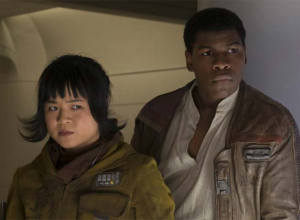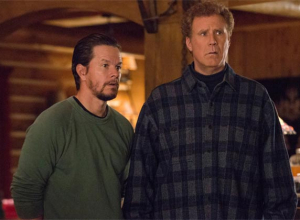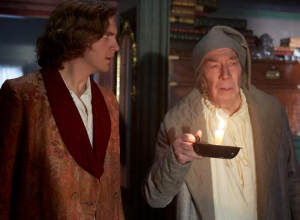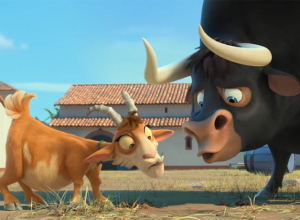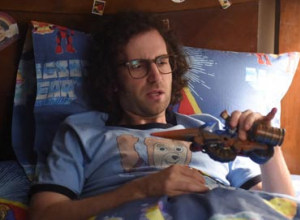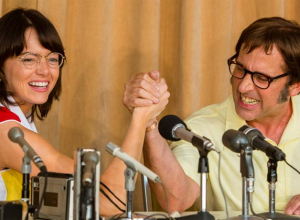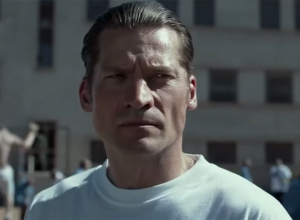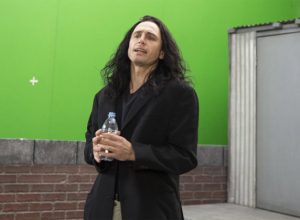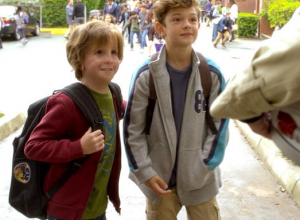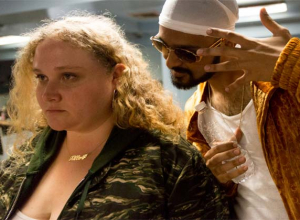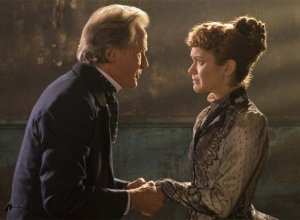The Cat's Meow Review
By Rob Blackwelder
Most film directors dream about making their "Citizen Kane," and while few would have the audacity to try to equal Orson Welles' cinematic masterpiece, Peter Bogdanovich has found a way to do the next best thing.
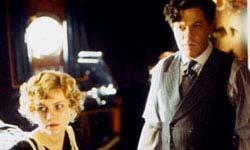
Where Welles borrowed famously from the life of William Randolph Hearst -- his ego, his powerful publishing empire and his scandals -- in creating the fictional Charles Foster Kane, Bogdanovich has commandeered an incessant rumor about an infamous and mysterious death aboard Hearst's yacht in 1924 and turned it into a foxy and spirited historical showbiz anecdote that lingers in your mind for weeks after seeing it.
"The Cat's Meow" is an ensemble piece packed with the best work of some under-appreciated actors including Edward Herrmann ("The Lost Boys," "Gilmore Girls") as an amusingly gruff Hearst whose paranoia has gotten the better of his nerves; Joanna Lumley ("Absolutely Fabulous") as sardonic novelist and socialite Elinor Glyn; Jennifer Tilly ("Bound") as sycophantic but opportunistic gossip columnist Louella Parsons; Cary Elwes ("The Princess Bride") as once legendary, now down on his luck movie producer Thomas Ince; and a delightfully devilish yet wisely understated Eddie Izzard ("Shadow of the Vampire") as Charlie Chaplin. All these famous names were among the billionaire's onboard guests that fateful weekend.
But it's the spunky, sensual, savvy performance of Kirsten Dunst in the pivotal role of Marion Davies -- the young actress who was Hearst's mistress, and more importantly the lustful Chaplin's object of desire -- that fuels the movie's plot, its effervescent spirit and its apprehensive soul.
Looking every inch the flapper and personifying both the innocence and indulgence of the age without seeming silly, Dunst is perfection from the moment she appears on screen. Bubbly and brave, girlish but wary, devoted to the doting Hearst yet suffocating in his tight grip, Marion recognizes her place in the world. Dunst, in turn, recognizes in her character both a joie de vivre and an underlying sadness and dissatisfaction with being a kept woman, an object of scorn and a perceived gold digger.
The film's plot -- "the whisper told most often," to quote Lumley's voice-over, about that weekend's events -- is fueled by Marion's frustration. It turns on her flirtations with Chaplin, who says he's in love with her (to which she laughs, "Not as much as you're in love with yourself, Charlie.")
Their dalliance is overheard by Ince, the financially troubled producer, who decides to use this knowledge as leverage with the forever suspicious Hearst in the hopes of gaining the billionaire's trust and turning that trust into a business partnership that could save his career.
As tensions mount -- eventually leading to a tragic case of mistaken identity and murder -- the guests all gossip behind one another's backs, and Bogdanovich directs his actors to subtly spectacular performances while delighting in period detail and the minutiae of Hearst mythology.
Ince's desperation and anxiety is written all over the expressive face of Elwes, whose body reacts as if he's been beaten with a bag full of bricks every time Hearst rebuffs him. You can see the gears spinning in his mind as he willingly but ashamedly comes back for more, knowing his livelihood is on the line.
Herrmann garners surprising sympathy for Hearst through his genuine, if misguided and obsessive, adoration of Marion. Izzard and Lumley (who drolly narrates from time to time) are wonderfully wry as cynical Hollywood seen-it-alls who are loathe to admit they enjoy the showbiz mire that they verbally vilify in the tartiest and wittiest of the film's sharp dialogue (written by Steven Peros, who adapted the picture from his own play).
Photographed in color but deliberately designed to look as black-and-white as a piano keyboard, the film envelops the viewer in jazz-era atmosphere like a fog. "The Cat's Meow" also benefits on many levels from Bogdanovich's fondness for and personal familiarity with his subject matter. He was a friend and fan of Orson Welles (he's even written a book on that director's works), whose influence is felt in the film's grim undertones and in its depiction of W.R. Hearst's mystique. Bogdanovich's own relationships with young starlets (Cybill Shepherd during "The Last Picture Show," Dorothy Stratten during "They All Laughed") and proximity to related tragedy (Stratten was later murdered) also contribute in no small part to the thick sense of irony wafting through the picture.
Yet even with dark themes looming, "The Cat's Meow" remains strangely buoyant, vivacious and amusing because of Dunst, who maintains Marion Davies' contagious gaiety throughout the film while handling beautifully and emotionally the burdens and secrets thrust upon her.
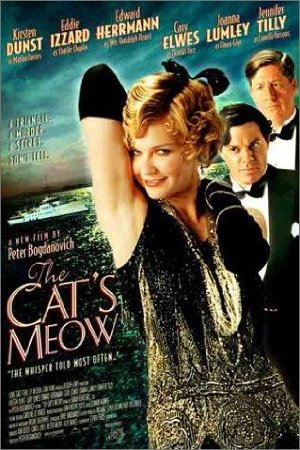
Facts and Figures
Year: 2002
Run time: 114 mins
In Theaters: Friday 4th June 2004
Box Office USA: $3.2M
Box Office Worldwide: $3.2M
Budget: $7M
Distributed by: Lions Gate Films Releasing
Production compaines: CP Medien AG, Lions Gate Films, Dan Films
Reviews
Contactmusic.com: 3 / 5
Rotten Tomatoes: 75%
Fresh: 93 Rotten: 31
IMDB: 6.4 / 10
Cast & Crew
Director: Peter Bogdanovich
Starring: Kirsten Dunst as Marion Davies, Edward Herrmann as W. R. Hearst, Eddie Izzard as Charlie Chaplin, Cary Elwes as Thomas Ince, Joanna Lumley as Elinor Glyn, Jennifer Tilly as Louella Parsons
Also starring: Victor Slezak
